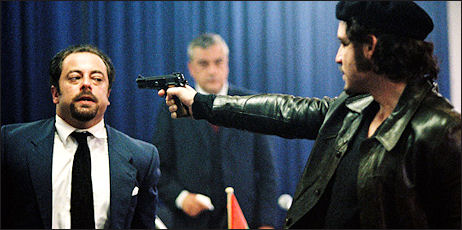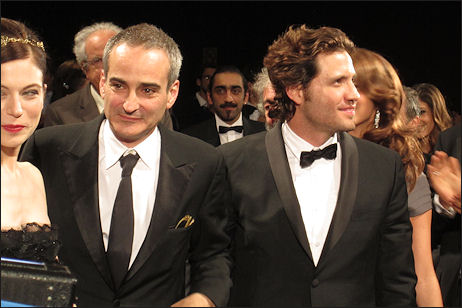Olivier Assayas‘ Carlos, which screened earlier today, is a fascinating, never-boring, you-are-there masterwork of a certain type. Not exactly a levitational thing and more in the realm of long triple than a home run, but exquisitely done in so many small and great and side-pocket ways that there’s really no choice but to take your hat off and say “sure, yes, of course.”

Carlos star Edgar Ramirez (r.) during the OPEC hostage-taking sequence, which occupies a sizable portion of Act Two.
This is a politically crackling, intrigue-filled saga of Carlos the Jackal (a.k.a, Ilich Ramirez Sanchez) with a no-bullshit, this-is-what-it-was, rock-solid authority in every line and scene and performance — no Hollywood crap of any kind, no comic relief and nothing artificially heightened. And it boasts a riveting, never-alienating but never-sympathetic lead performance by Edgar Ramirez, whom I know from relatively recent roles in Che and The Bourne Ultimatum (in which he played a bad guy who cut Matt Damon a break at the end).
It’s essentially a portrait of a hard-charging, true-believing, very impressive type-A asshole who loved guns and blowjobs and Marlboros and being forceful and committed, and who enjoyed a kind of haunted celebrity for a few years during the 1970s when anti-capitalist revolution and terror were in fashion, at least in some overseas circles.
Carlos doesn’t exactly throb with emotional poignancy or resonance, or deliver what you might call a ground-level universal theme. All it “says,” really, is the same thing that any film about a terrorist or a gangster says, which is basically “live hard, burn brightly and enjoy the passion and thrills while you can, pal, because you’re looking at an early death or being sentenced to a very long jail term before you hit middle-age.”
But then it’s hardly fair to expect this kind of film — an exacting, fact-based account of the life and times of a fierce and somewhat chilly sociopath who doesn’t laugh or smile much or pet kittens or make friends with homeless children — to swim in streams of emotionality or meditation, even. Like Che, Carlos is simply about “being there” and believing everything you hear and see, although it delivers much more in the way of urgency and tension and thrills that Steven Soderbergh‘s film did. It occasionally settles down for brief periods, but it never drops the ball.

Carlos director Olivier Assayas (l.) and star Edgar Ramirez absorbing applause inside the Grand Lumiere following this afternoon’s screening.
I told a video crew on my way out of the screening that I’d be interested to see if Assayas can make the shorter U.S. theatrical cut — reportedly expected to come in around two and a half hours — work. I don’t see how it can. I would think that this version would have to be at least three hours, although even that sounds like a difficult feat. All I can say is that when the intermission came at the end of Act Two, which was somewhere close to the three hour mark, I was fully engaged and in no way yearning for a time-out.
The final act, being about changing times, the ebbing of leftist revolutionary fervor and Carlos-friendly governments in the ’80s, the collapse of communism and Carlos losing his headline-grabbing favor as the world’s most audacious terrorist, is the least engrossing. But again, it’s never dull — just not as charged.
There’s one recurring element that Carlos doesn’t quit on and is almost fanatical about, and that’s cigarettes. So many effin’ Marlboros and Gitanes are smoked during this thing that I felt as if my own lungs were aching with first-stage cancer by the time it was over. Everyone except the Muslim characters, it seems, is also gulping whiskey in every other scene. No Frescas, Cokes or Perriers — straight booze all the way.
Ramirez, who resembles the younger real-life Carlos, has a face that could almost be Johnny Depp‘s if Depp gained 20 or 25 pounds. He also looks a bit like Nick Lachey (i.e., Jessica Simpson‘s ex) and Neville Brand, who played Al Capone on the old Untouchables series. As with any noteworthy performance Ramirez never seems to be “acting.” That’s also how Benicio del Toro‘s Che Guevara played, of course, and yet Benicio was delivering a somewhat warmer, gentler fellow. As Soderbergh depicted him, I mean.
The story is the story is the story. I always go to the appropriate Wikipedia page after seeing any kind of history-based film, and this was no exception. In fact, do that now.
The real Carlos is now doing a life sentence in La Sante prison, which is located in the 14th arrondisement of Paris. I wonder if he has TV privileges (probably) and whether or not Assayas or IFC’s Ryan Werner will send him a DVD of the long version, and whether Carlos and his cellmates (including Manuel Noreiga) will be allowed to watch it together in the TV room. Throw in some soft drinks and a couple bags of tortilla chips…why not?
